|
|
|
Sort Order |
|
|
|
Items / Page
|
|
|
|
|
|
|
| Srl | Item |
| 1 |
ID:
140267


|
|
|
|
|
| Summary/Abstract |
This article examines the role of the Islamic State of Iraq and Syria's (ISIS's) beheading videos in the United Kingdom and the United States. These videos are highly illustrative demonstrations of the importance of visual imagery and visual media in contemporary warfare. By functioning as evidence in a political discourse constituting ISIS as an imminent, exceptional threat to the West, the videos have played an important role in the re-framing of the conflict in Iraq and Syria from a humanitarian crisis requiring a humanitarian response to a national security issue requiring a military response and intensified counterterrorism efforts. However, this article seeks to problematize the role and status of ISIS's beheadings in American and British security discourses by highlighting the depoliticizing aspects of reducing a complicated conflict to a fragmented visual icon. The article concludes by emphasizing the need for further attention to how the visibility of war, and the constitution of boundaries between which acts of violence are rendered visible and which are not, shape the political terrain in which decisions about war and peace are produced and legitimized.
|
|
|
|
|
|
|
|
|
|
|
|
|
|
|
|
| 2 |
ID:
140273
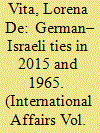

|
|
|
|
|
| Summary/Abstract |
This article marks the fiftieth anniversary of the establishment of diplomatic relations between the Federal Republic of Germany and Israel. It is divided into two parts, assessing the status of this unique relationship in 2015 and in 1965, respectively. Angela Merkel's recent criticism of Benjamin Netanyahu's stance on the peace process with the Palestinians and the heavy protests that took place in Germany in the wake of Operation Protective Edge in Gaza in summer 2014 have cast doubt on the strength of the bilateral partnership fifty years after the first exchange of ambassadors between the two countries. However, by examining the state of German–Israeli cooperation in a number of areas (security, commerce and knowledge exchange, among others), the first part of the article challenges popular interpretations of contemporary German–Israeli relations as being ‘at a nadir’. Fifty years ago, Chancellor Ludwig Erhard proposed to his Israeli counterpart Levi Eshkol the establishment of diplomatic relations between the two countries amid a severe political crisis in Bonn, following a visit of the East German leader Walter Ulbricht to Gamal Abdel Nasser. While much has changed since then, the second part of the article argues that looking at the momentous events of 1965 can provide useful reference points for understanding the current state of relations between Germany and Israel.
|
|
|
|
|
|
|
|
|
|
|
|
|
|
|
|
| 3 |
ID:
140271
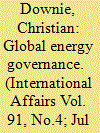

|
|
|
|
|
| Summary/Abstract |
It is widely accepted that the rising power of the BRIC countries—Brazil, Russia, India and China—has the potential to re-shape the international system. However, little attention has been given to the BRICs’ role in a growing area of strategic importance: global energy governance. While global governance scholars now argue that the international energy architecture requires substantive reform to keep pace with the rapid transformations in global energy markets, largely driven by the BRICs, it is not clear what role these countries will play in future governance arrangements. Drawing on recent scholarship in global governance and international negotiations, interviews with G20 energy officials, and the observations of the author, a past delegate to G20 negotiations, this article examines whether the BRICs as a coalition have the capacity and willingness to drive substantive global energy governance reform. In doing so, it highlights the problems with the BRICs as a coalition on energy and considers the prospects for energy reform in light of China's increasing engagement with energy governance ahead of it hosting the G20 Summit in 2016.
|
|
|
|
|
|
|
|
|
|
|
|
|
|
|
|
| 4 |
ID:
140268


|
|
|
|
|
| Summary/Abstract |
The idea of non-alignment has remained a central component of Indian identity in global politics that is manifest in continuities: since independence in 1947 India has been in pursuit of strategic autonomy, a quest that in practice has led to semi-alliances fashioned under the cover of non-alignment and shaped by regional dynamics. In this setting, the rise of China now raises an interesting conundrum for Indian policy-makers as New Delhi seeks to balance the benefits and risks of an increasingly assertive neighbour and a network of alliances with like-minded countries. This article approaches this enigma by delineating continuities of non-alignment from the early roots of the policy, through the Cold War-era and into the modern-day international system. Though domestic factors have had a significant influence on the trajectory of Indian foreign policy, the continuities of non-alignment have prevailed through changes in leadership and domestic vicissitudes. By exploring the foundation of non-alignment and how India has operationalized the policy, this article maintains that to some extent continuity will persist: India will likely continue its rhetoric in favour of strategic autonomy while moving closer to the West and its allies in practice. Yet in order to effectively balance China's growing influence, India will need to be more assertive in building these alliances, as the success of its modern-day pursuit of strategic autonomy may well rest on a strong foundation of strategic partnerships. The coming to office in May 2014 of the National Democratic Alliance government led by Narendra Modi has signalled a move away from even the rhetoric of non-alignment, with significant implications for the future of Indian foreign policy.
|
|
|
|
|
|
|
|
|
|
|
|
|
|
|
|
| 5 |
ID:
140265


|
|
|
|
|
| Summary/Abstract |
For the past decade, much attention has been devoted to the potential consequences of a nuclear-armed Iran. Yet the binary ‘acquisition/restraint’ lens through which the Iranian nuclear issue is frequently viewed is limiting. There is now much evidence to suggest that Iran is engaged in a strategy based on nuclear hedging, rather than an outright pursuit of the bomb. This does not change the need to contain Tehran's proliferation potential, yet it does add another layer of complexity to the challenge. Iran will retain a low level of latency whatever the final outcome of longstanding diplomatic efforts to constrain the scope and pace of its nuclear efforts. This article will explore the implications of Iranian nuclear hedging and consider how regional rivals might interpret and respond to Tehran's nuclear strategy. On a larger scale, the article will explore the potential impact of the international community's approach to the Iranian case—implicitly recognizing, even giving legitimacy to, hedging—both in terms of the future of the Nuclear Non-Proliferation Treaty (NPT) and the ability of the international community to limit the negative effects of this form of proliferation behaviour.
|
|
|
|
|
|
|
|
|
|
|
|
|
|
|
|
| 6 |
ID:
140269


|
|
|
|
|
| Summary/Abstract |
The expansive use of armed unmanned combat aerial vehicles (UCAV), or ‘drones’, by the United States over the past decade has occurred within a particular strategic context characterized by irregular warfare operations in permissive environments. Ongoing strategic, ethical and moral debates regarding specific uses of drones may well be overtaken by a new generation of armed combat drones able to survive and operate in contested airspace with design elements such as stealth and greater levels of machine autonomy. These design parameters, and the likely strategic context within which second generation UCAVs will be deployed, suggest a fundamentally different set of missions from those performed by the current generation of drones. The most beneficial characteristic of current unmanned systems has been the ability to combine persistent surveillance with the delivery of small precision-guided munitions. With a shift to more contested environments, this type of armed surveillance mission may become less practical and second generation UCAVs will instead focus on high intensity warfare operations. These new systems may have significant implications for deterrence, force doctrine and the conduct of warfare.
|
|
|
|
|
|
|
|
|
|
|
|
|
|
|
|
| 7 |
ID:
140270
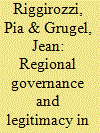

|
|
|
|
|
| Summary/Abstract |
Over the last decade, rapid changes to development models and market rules have led—yet again—to a revision of the meaning of regionalism, bringing to the fore the role of regional organizations in anchoring democracy and supporting progressive social policies. This is particularly the case in South America, where the presence of regional organizations in public policy-making is a subject of increasing scrutiny. This article examines new forms of politically sensitive regional governance in South America, focusing in particular on the case of the Union of South American Nations (UNASUR). It shows how contemporary South American regionalism bypasses the questions of trade and investment that dominated earlier schemes of regionalism in order to focus on shoring up democracy and managing the regional social deficit. The article explores UNASUR's actions in two policy areas: supporting the regional democratic norm and health policy. UNASUR, this article argues, is developing a hybrid form of output-focused legitimacy that rests on a combination of credible commitments to welfare promotion, especially for the poor, and the pursuit of collective public goods, alongside a robust defence of quite minimal but uncontroversial standards of procedural democracy across the region. The analysis challenges the view that regionalism has failed in South America and identifies instead the emergence of a new sort of highly political regionalism. We call for UNASUR to be taken more seriously in the literature on comparative regionalism and, indeed, for a revision of how regionalism more widely is understood in Latin America.
|
|
|
|
|
|
|
|
|
|
|
|
|
|
|
|
| 8 |
ID:
140272
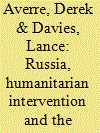

|
|
|
|
|
| Summary/Abstract |
Western analysis perceives Russian approaches to issues of humanitarian intervention and the Responsibility to Protect (R2P) as running counter to western-inspired international norms. This debate has surfaced with some vigour over Russia's policy in the Syria conflict where, in order to protect its strategic interests in Syria, an obstructionist Moscow has been accused of ignoring humanitarian considerations and allowing time for the Assad regime to crush the opposition by vetoing a resolution threatening to impose sanctions. While Russian approaches are undoubtedly explained by a desire to maximize its growing political influence and trade advantages to serve its legitimate foreign policy interests, and while Moscow's attitudes to intervention and R2P exhibit important differences from those of the major western liberal democracies, its arguments are in fact framed within a largely rational argument rooted in ‘traditional’ state-centred international law. This article first highlights key arguments in the scholarly literature on intervention and R2P before going on to examine the evolution of Russian views on these issues. The analysis then focuses on the extent to which Moscow's arguments impact on international legal debates on the Libya and Syria conflicts. The article then seeks to explore how Russian approaches to intervention/R2P reflect fundamental trends in its foreign policy thinking and its quest for legitimacy in a negotiated international order. Finally, it attempts to raise some important questions regarding Russia's role in the future direction of the intervention/R2P debates.
|
|
|
|
|
|
|
|
|
|
|
|
|
|
|
|
| 9 |
ID:
140266
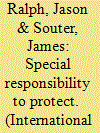

|
|
|
|
|
| Summary/Abstract |
In the summer of 2014 Islamic State in Iraq and Syria (ISIS) emerged as a threat to the Iraqi people. This article asks whether the UK and Australia had a ‘special’ responsibility to protect (R2P) those being threatened. It focuses on two middle-ranking powers (as opposed to the US) in order to highlight the significance of special responsibilities that flow only from the principle of reparation rather than capability. The article contends that despite casting their response in terms of a general responsibility, the UK and Australia did indeed bear a special responsibility based on this principle. Rather than making the argument that the 2003 coalition that invaded Iraq created ISIS, it is argued that it is the vulnerable position in which Iraqis were placed as a consequence of the invasion that grounds the UK and Australia's special responsibility to protect. The article addresses the claim that the UK and Australia were not culpable because they did not act negligently or recklessly in 2003 by drawing on Tony Honoré's concept of ‘outcome responsibility’. The finding of a special responsibility is significant because it is often thought of as being more demanding than a general responsibility. In this context, the article further argues that the response of these two states falls short of reasonable moral expectations. This does not mean the UK and Australia should be doing more militarily. R2P does not begin and end with military action. Rather the article argues that the special responsibility to protect can be discharged through humanitarian aid and a more generous asylum policy.
|
|
|
|
|
|
|
|
|
|
|
|
|
|
|
|
|
|
|
|
|